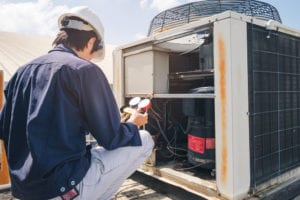 The decision to replace your old heating or cooling system is not an easy one. The sticker shock alone is enough to make anyone think twice about upgrading. Your heating and cooling systems may be over 10 years old, but they still work just fine, so why spend the money?
Then, the inevitable happens. It’s mid-January and your heating system decides to call it quits. You immediately call out a technician and they give you a rundown of your options: repair or replace. The repair is less expensive than the replacement, so you may be inclined to go with Option Number 1, but take a look at some of these potential costs of keeping your old heating or cooling system before you make a final decision.
The decision to replace your old heating or cooling system is not an easy one. The sticker shock alone is enough to make anyone think twice about upgrading. Your heating and cooling systems may be over 10 years old, but they still work just fine, so why spend the money?
Then, the inevitable happens. It’s mid-January and your heating system decides to call it quits. You immediately call out a technician and they give you a rundown of your options: repair or replace. The repair is less expensive than the replacement, so you may be inclined to go with Option Number 1, but take a look at some of these potential costs of keeping your old heating or cooling system before you make a final decision.
